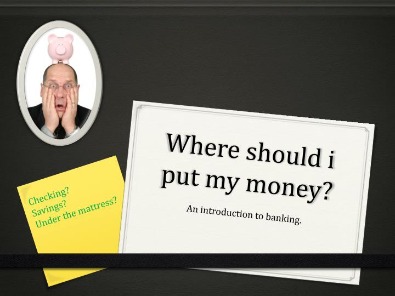Where Should I Invest My Money
Table of Contents Heading
- Investing Money For Beginners
- Money
- Step 1: Set Goals For Your Investments
- Decide How Much Help You Want Investing
- Compare Accounts
Stocks, Forex, real estate is ok for some of your cash, but you’re 18, take a calculated risk and learn business and create value in world with the majority of your cash . asking this rabble what to do with you money, is a sure fire way to attract the wrong people.

Investments are the opposite of savings because they’re meant to grow money that you spend in the distant future, namely in retirement. Investing is also best for smaller goals you want to achieve in at least 5 years, such as buying a home or taking a dream vacation.
If you need more info, check out our review post on investing with Prosper. Although investing $65,000 has little to do with credit card rewards, we wanted to include this tip from our resident credit card expert, Holly Johnson. If you have a credit card with a 15% interest rate carrying a $10,000 balance, you have an opportunity for a great return on your investment. The same interest rate risk issue applies to corporate bonds; holding to maturity will eliminate this one piece of risk. Corporate bonds are even riskier than municipals and Treasury bonds because they are not backed by a state, local, or Federal government. The more significant risk is “interest rate risk.” In a low-interest-rate environment, if rates rise in the marketplace, the value of the bond decreases to compensate.
Investing Money For Beginners
You’ll likely need as little as $1 to open an online savings account. If you have a 5-year window for investment, however, a Series I bond is both secure and inflation-resistant. True, the long-term returns for stocks are impressive.
That includes direct communication from the Federal Reserve, ECB and others, as well as changes in market expectations, as investors attempt to predict what central bank committees might do. Looking ahead, the pickup in economic activity is likely to be driven by supply rather than demand. Much of the consumption seems to be attributed to near-term stocking of electronics (driven by “work from home”) and medical equipment. Lastly, the outlook for “slowly but steadily” increasing participation by, and inflows from, investors continues to look favorable. These lead us to think there may once again be pressure to lower rates rates in the medium term, after it ebbed in the summer. goes long the stocks mentioned by Ketterer, and many more, said Balchunas. It also shorts—bets against—the yen, and weights stocks by the size of their dividend.
Money
Now that you’ve made the right choice in deciding to save for retirement, make sure you are investing that money wisely. My dad is in the oil business and gives me some of his profits generating my income to over $15k a month. I am wanting to invest $50-$300k of my money into something online in December/ late January but don’t know exactly what.
In a world where central banks have created mountains of monetary liquidity and investors expect double-digit percentage annual returns from stocks, these steady oil majors can’t compete. For many investors, the prospect of a few percentage points of capital gains plus 5% or more in dividend yields must look rather dull. But dull might be just the right answer in the next few years. To temper volatility from cyclical stocks that are influenced by the economy, adding equities with consistent earnings growth seems prudent. A good example of this are companies that provide outsourcing for operations such as finance and accounting, reporting, web development, call centers, HR functions, marketing, and so on. Comparing the yield to the three-month trailing volatility of the asset class, you get a ratio of more than 1.3.
Step 1: Set Goals For Your Investments
A wider usage of additional devices—such as smart watches and a second mobile phone for work—is also driving up data usage and subscriber growth. It holds stocks such as Exxon Mobil, Chevron and BP, and has a little more than 20% of the fund in Europe.
The accounts typically offer lower interest rates than certificates of deposit, but the cash is more accessible. The catch with a CD is that you will have to keep the money in the CD for a specified amount of time; otherwise, a penalty, such as losing three months’ interest, will be assessed.
And cash or cash equivalents, such as money market funds, give you the lowest, but safest returns. Even if your employer doesn’t match contributions, I’m still a big fan of using workplace retirement accounts because they give you multiple benefits. Not only do they automate investing by deducting contributions straight out of your paycheck before you can spend them, but retirement plans also cut your taxes. And you can take all your money with you—including your vested matching funds—if you leave the company. But what can you do to guard your money and still have it growing while you wait? There are a few great places to safely invest payment money until it comes time to purchase your property, including FDIC-guaranteed bank accounts, FDIC-insured certificates of deposit, U.S. Treasury bills, money market accounts, and U.S. savings bonds.
Decide How Much Help You Want Investing
The fund is diversified across sectors and issuers, with nearly 82% in U.S. corporate debt. Lower for longer was a phrase coined several years ago as interest rates stayed at historically low levels for longer than nearly anyone had predicted. is a cheap-and-deep passive alternative holding 1,700 junk bonds and charging 0.15%. The actively managed municipal bond fund has a focus on high yield and currently yields 3.1%. More than 65% of the fund’s positions mature in over 10 years. FMHI has $140 million in assets and an expense ratio of 0.55%.

It’s not sexy and it won’t wow the neighbors, but getting an automatic $0.50 for every dollar you save is tough to beat. One hidden benefit is the absence of reinvestment risk.
Compare Accounts
This can be risky, because now you’re not just counting on companies, but you’re counting on individuals to pay you back with interest. But there are platforms that allow you to do this easily, and by spreading out small loans of just $25, you can minimize the risk of default. The most common way for investors to invest in commodities with just $1,000 is through ETFs or ETNs. These are traded on the stock market – here’s a list of ETFs and ETNs that invest in commodities. Over the past 30 years, the price of gold has risen 335%. At the same time, the Dow Jones Industrial Average has risen 1,255% – almost 4x more. As you can see, it’s not a bad place to park your money, but you won’t earn as much as stocks over the long run.

But keep in mind that there may be a lot of ups and downs and there is a generally higher risk of loss in stocks than in investments like bonds. Over the short term, the stock market is unpredictable, but over the long term, it has historically trended up. No matter how you choose to invest, start by paying down your debt and making sure your emergency fund is properly funded.
It’s worth learning how to find and open these accounts. And make sure to shop around for the best high-yield savings account rates to ensure you’re maximizing your savings. The money in a savings account is insured by the Federal Deposit Insurance Corporation up to certain limits. I will continue to spend money on my home to maintain and shape it to my life’s needs, but that is purely consumption. You may think you need a large sum of money to start a portfolio, but you can begin investing with $100. The amount of money you’re starting with isn’t the most important thing — it’s making sure you’re financially ready to invest and that you’re investing money frequently over time. I have a online savings account at GE Capital Bank, easy to withdraw my money and the funds are in my checking account the next day.
Start By Making Small Investments
For long-term goals, you have more leeway to invest in more volatile assets. Traditional real estate investing involves buying a property and selling it later for a profit, or owning property and collecting rent as a form of fixed income. But there are several other, far more hands-off ways to invest in real estate. best brokers for ETF investing.) Robo-advisors also use ETFs to construct client portfolios.
- So I’m going to walk you through this balance sheet in detail to help explain the full scope of my money allocation.
- Although actual real estate investing is interesting to me, I’m not knowledgeable or confident enough quite yet.
- Dividend stocks can provide the fixed income of bonds as well as the growth of individual stocks and stock funds.
- Retirement planning is the process of determining retirement income goals, risk tolerance, and the actions and decisions necessary to achieve those goals.
- Most investors only think of what they can make when they put away money.
John Csiszar is a freelance writer who has 18 years of experience as a registered investment advisor. He covers a wide range of personal finance topics with an emphasis on investing and retirement planning. John has written for other notable publications and companies including USAToday.com, The Huffington Post, US News & World Report, Quicken, TurboTax, SF Gate, Experian, and TransUnion.
Building my savings account too as most of this money will be used for other investing ventures outside of the stock market. But until I’m more comfortable and have enough saved, I will not be mindlessly dumping money into anything else. The obvious and most common place to invest your money is the stock market. This can include a brokerage account, 401k’s, IRA’s, and individual stocks of companies.
It doesn’t matter how much or how little money you have, it’s always a good idea to invest as much as you are able to. If you start investing in your 20s, you can invest as little as a few thousand dollars a year and you will be well on your way to preparing for retirement. However, the bot chooses investments based on the Modern Portfolio Theory , which won’t allow your investments to produce great returns or even beat the market. A robo-advisor will manage your money—yep, you guessed it—robotically using a computer algorithm. This type of investment management has gained popularity because it is less expensive than paying a financial advisor but still allows you to be hands-off. For both of these options, you will be charged fees based on a percentage of your investment in return for the advisor’s or money manager’s service.
However, like other mutual funds, the fund itself is not government-backed and is subject to risks like interest rate fluctuations and inflation. If interest rates rise, prices of existing bonds drop; and if interest rates decline, prices of existing bonds rise. Just like a savings account earning pennies at your brick-and-mortar bank, high-yield online savings accounts are accessible vehicles for your cash. With fewer overhead costs, you can typically earn much higher interest rates at online banks. Plus, you can typically access the money by quickly transferring it to your primary bank or maybe even via an ATM. Rather than having the money sit in a non-interest-bearing checking account, you could grow the money by investing it instead.
You might get something around 1% on a 1 year CD, and 2% on a five year CD. The Fed raised rates today, so I’d wait to see what that does to CD rates. Since the Fed is promising to raise rates several times in the current year, you may want to go with shorter terms, like 6 months or less, so you can take advantage of higher rates.

